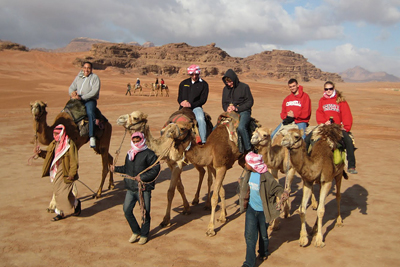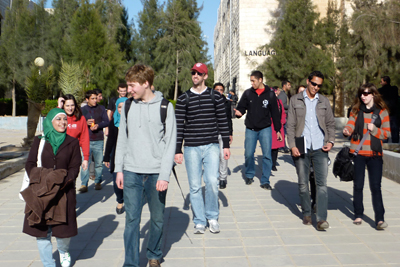Students apply Arabic language skills in Jordan
By Daniel Aloi


Americans speaking colloquial Arabic are not a common sight in Amman, Jordan, but students in Cornell's Intensive Arabic Program are doing just that at Hashemite University in the pilot year for the program.
The language program, sponsored by the Department of Near Eastern Studies, involves a fall semester with 16 credits of intensive intermediate Arabic study on the Ithaca campus, and a spring semester of cultural immersion in Jordan with a full course load at a Jordanian university.
Limited to 12 students, the program is accepting applications for next year until April 1. As a prerequisite, students may take an intensive summer program in Arabic if they have not studied elementary Arabic the previous academic year.
Munther Younes, the Reis Senior Lecturer in Arabic Language and Linguistics, directs the program and accompanied students to Jordan. Courses follow an integrated approach, with written and spoken Arabic taught simultaneously.
"When they initially arrived [in Jordan], people couldn't believe these were American students," said Kim Haines-Eitzen, chair of Near Eastern Studies. "For students to be doing so well in such a short period of time means Munther's integrated method is really working."
Three of the courses the students are taking in Jordan -- Current Events in the Arab Media, Arabic Grammar, and Jordanian Society and Culture -- were designed for the Cornell program. Ten Cornell students are taking other courses taught in Arabic at Hashemite University: Democracy and Human Rights, Comparative Political Systems, and Childhood Psychology.
"Judging by the feedback I get from the professors and the students themselves, they seem to be doing well in these courses, actively participating, and enjoying them," Younes said.
Each student is paired with a Hashemite University student as a language partner. "This opportunity has given each Cornell student the attention to practice speaking and listening on an intimate level," said Jeffrey Song '11.
Required community service projects also place the students in direct contact with Jordanians. Six of the students also have been teaching English to Iraqi refugees.
A few students, paired with their Hashemite counterparts in a biology course, are working to identify such community problems as smoking in public places and littering. They will be interviewing people about the issues and proposing solutions, Younes said.
Students are also visiting other Jordanian cities, landmarks and tourist sites, and other Middle Eastern countries, including Syria, Israel and Egypt.
"Personally, [the experience in] Jordan has been more than just learning the language, but rather learning about the culture and the reality of what is going on in the Middle East," Song said.
Some of the students are blogging about their semester in the Middle East.
"I'm finding that I'm remembering more words than I thought I would, and that words are flowing better than I expected," Emily Smith '10 writes on her blog. "I had a few conversations with taxi drivers, and I've understood most of what they've said, but they typically speak a little slower and clearer than workers on the bus or in service taxis."
On her blog, Jillian Lyon '11 recalls meeting two store owners during a trip to Madaba: "We talked to them a little bit in Arabic, and they were impressed so they asked if we wanted to sit and drink chai … They spoke to us the entire time in Arabic, and we seemed to cover a lot of topics … To me, as long as I am speaking Arabic with new people -- I am happy!"
For information, see http://www.arts.cornell.edu/nes or contact the Department of Near Eastern Studies at 607-255-6275 or 255-1329.
Media Contact
Get Cornell news delivered right to your inbox.
Subscribe